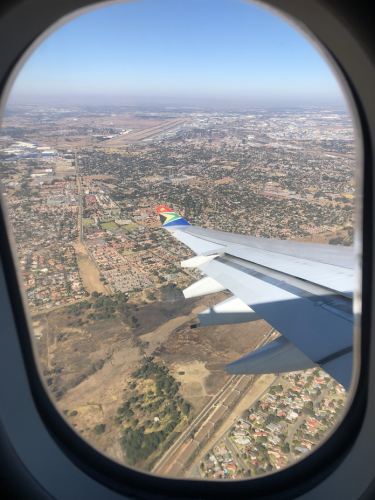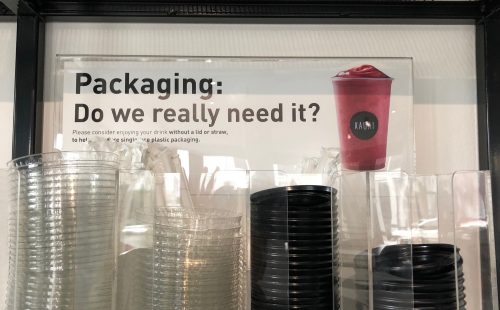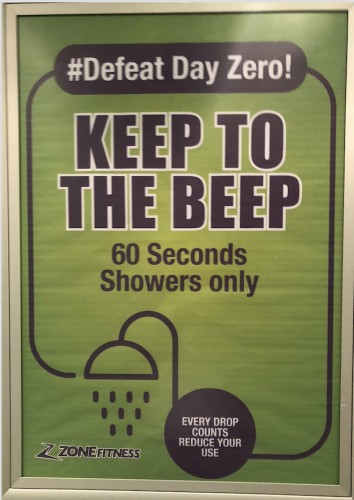On principle, people who apply to take part in a service trip are looking to offer something of themselves to a foreign community; whether it’s their time, knowledge, or physical labor, the object is to give. My intention in coming here was to learn, but it was mostly to position myself as a helping hand. However, since arriving to South Africa a little over a week ago, I am now sure that this country will be giving me much, much more than I could ever give to it. That may sound cheesy, but I’ll explain. Despite America’s fundamental obsession with its exceptionalism, these past days have shown me how much we have to learn as a country, and as a people, from South Africa.

Above all, the spirit here is unlike any I’ve ever witnessed. Beginning at our dinner on the first night in Johannesburg, the smiles around us were infectious. We busied ourselves watching the locals at the restaurant swaying in their seats to the beat of the music being played; preoccupied by this people-watching, the long wait for our meals barely fazed us. At a table far removed from the dance floor, we watched a man stand up, and still facing his table-mates, he danced to the beats the DJ blared without a care in the world. All of this felt natural and unforced—a nonchalant act of both confidence and comfort. If only us Americans felt this liberty in our daily lives; I can’t imagine the difference it would cause. This energy was to be replicated time and time again; our locations would change but the overall mood would remain the same: cheerful and rhythmic. Whether it was our activist professor turned tour guide, Calvin, cracking jokes, the eclectic individuals on the streets whose fashion sense I envied, or the employees at the café in the Joburg airport who sang out each and every order being placed, the ambiance in the city was refreshing and warm. I can only hope that after these two months I will take some of it back with me.
In a more tangible sense, both the care for the environment as well as the attention to and widespread knowledge of the political landscape are exciting to see, coming from a country where political talk is largely considered taboo and the worsening state of the environment is ignored. Firstly, the critical push toward water conservation is evident at every turn; whether I’m at the gym, a restaurant, or a museum, there are steps being taken to limit consumption of water. At the gym, showers are limited to 60 seconds. In most public bathrooms, the sinks are turned off, with hand sanitizer used as a substitute. Our own B&B keeps a bucket in the shower for us to save the water that runs while we wait for it to warm up. Considering the city was able to push back Day Zero—the day when it would officially run out of its water supply—into oblivion, I would say that these efforts have proven effective, to say the least. Their care for the environment doesn’t stop there. At our local health food joint in Cape Town, straws and lids are offered with a guilt-inducing sign against using them, causing its patrons to think about the repercussions of using these plastic, unnecessary pollutants. None of these efforts seem forced either; there is a genuine care and thoughtfulness about the implications of our actions. These examples are just a few that represent what a country can do if it bands together to achieve a goal.



In terms of politics, the public’s engagement with the politics, regardless of age, is impressive, to say the least. Coming from the U.S. where the majority of people avoid heated political discussion due to the polarizing nature of our current government, this open conversation about the political atmosphere in South Africa is thrilling. Representative of the public’s interaction with politics is the fact that South Africa is the protest capital of the world, holding more protests per capita than any other country, a stat which Noor, a professor at Wits University, shared with us. Most importantly, in my view, is that the youth’s involvement in politics is embraced, an idea most evident when looking at the national holiday celebrated on June 16th, Youth Day. Memorializing the Soweto Uprising of 1976, the day honors the youth’s role in promoting justice and being critical to the achievement of progress in the country. I find this concept particularly exciting due to the United States’ rampant ageism in politics—that is, until recently especially regarding the issue of gun violence, which brings me hope that we are starting to uphold the opinions of our country’s young people, rather than silencing them. Celebrating this holiday here offered a new, welcomed perspective on the potential the youth have to make a positive difference within their country.
These are just a few, noteworthy lessons I’ve learned thus far. I’m sure that the longer I am here, the more I will learn from this country and its history.
